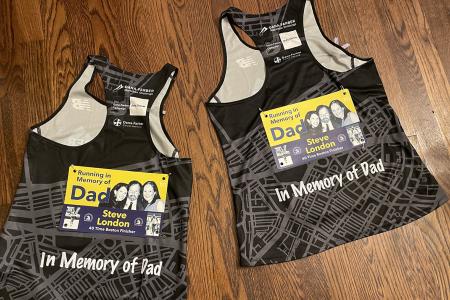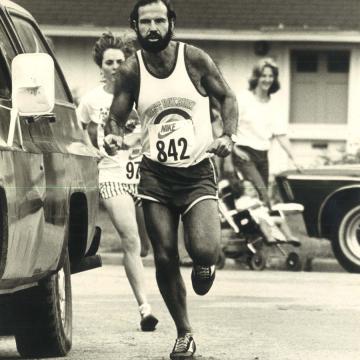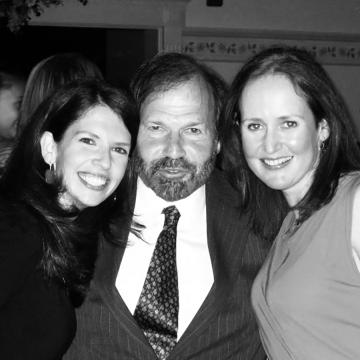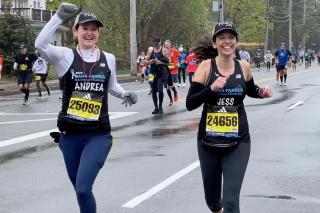Knowing how significant running was to Professor Stephen London (1942–2022), his daughters Andrea London and Jessica London-Rand ’04MSW ran the 2023 Boston Marathon to honor his legacy, and continue to fundraise in his name. We spoke with them about their father’s love of athletics, his commitment to civil rights, and the fervor for community engagement that he instilled at Simmons.
“My elder sister Andrea and I are 14 years apart and have different mothers, so some of our childhood memories are different. But one thing we both remember vividly is that running was a central part of our father’s life,” says Jessica London-Rand ’04MSW, daughter of the late Stephen London (1942–2022).
As Professor of Sociology and Founding Director of the Scott/Ross Center for Community Service at Simmons, renamed The Stephen D. London Center for Community Engagement and Social Justice in 2023, Professor London was a cherished presence at Simmons and throughout Boston.

“Since running was so important to our dad, we decided to run the 2023 Boston Marathon to honor him,” explains Andrea London. (Incidentally, Andrea’s mother and Stephen London’s first wife, Karen Davis, is a Class of 1964 Simmons alumna). The London daughters were able to inform their father about their joint decision before his passing in December of 2022.
“At that point, he had been battling pancreatic cancer for five years,” says Jessica. “He was being treated at the Dana-Farber Cancer Institute and developed a great relationship with his oncologist. We were so grateful to Dana-Farber that we wanted to run and raise money for them at the 2023 Marathon, and we managed to raise over $60,000.”
While the sisters themselves did not run in the 2024 Boston Marathon on April 15, they continued the “Running for Steve London” campaign to generate funds for Dana-Farber while family friend Jivago Rodrigues ran the race.
Andrea and Jessica find running a marathon to be a moving and therapeutic experience. “For many years, we had been spectators at our dad’s marathons,” says Jessica. (Andrea, however, participated in past marathons in Chicago and New York). “Now running alongside my sister Andrea, we reminisced about our father during the race. Indeed, the Boston Marathon has become an emotional event for our whole family.”
Devoted to Physical Fitness

“Dad was incredibly disciplined and ran every single day,” recalls Andrea. “He woke up at 4:44 am every morning and would run 8–10 miles. As kids, he would tell us, ‘When you get older, work full time, and have children, the only part of the day you own is when everyone else is sleeping.’ That’s always stayed with me.”
While Professor London cultivated a rich social life, the solitude of running helped him recharge. “I think running was a restorative practice for our dad. He was involved in so many things, so running centered him and helped balance his life. He never played music during his runs; he used that time to contemplate how to solve the world’s problems,” says Jessica. “And he planned his lectures when running,” adds Andrea.
Professor London was also influential in the development of Simmons’ athletic programs. “He was an enthusiastic sports fan, so when the campus gym was being built he created training programs for Simmons students who were interested in running long distance,” says Andrea. “He loved that he could share with the Simmons community his passions for running and community service.”
Melding Civil Rights with Community Work
Born to Jewish immigrants and raised in Quincy, MA, Stephen London came of age in the 1960s. During this time, he developed a keen awareness of community and social justice. One of his first life-changing experiences occurred as an undergraduate student at Bowdoin College, where he studied with Professor Reggie Lewis, the institution’s first Black faculty member. As one of his Bowdoin classmates later recounted, London disappeared from campus to make trips to Washington, D.C., most notably to witness Dr. Martin Luther King’s “I Have a Dream” speech in 1963. London obtained his Ph.D. in Education and Sociology from the University of Chicago, with a focus on racial and social equity.
“From early on, his academic life became intertwined with larger community concerns,” says Andrea. “That aspect of social responsibility became so much of who Jessica and I are as people, too.”
London’s first faculty position was at Wellesley College. Prompted by a group of Black students, he founded the Afro-American Studies program (now the Africana Studies major housed within the Africana Studies Department). In a 1968 interview, Professor London underscored the importance of this new curriculum to Dexter D. Eure, a legendary Black columnist of The Boston Globe: “As a teacher, I feel very strongly that students should have the opportunity to come to grips with the [contemporary social, political, and racial] issues in their academic work. The Black-White issue is not a temporal problem, it has been with us for several hundred years and will most likely become even more complex in the future. The [Afro-American Studies] major will allow students . . . [to understand the] historical, sociological, and economic factors that have produced the discrimination and separation in our society.”
As Andrea remarks, “When you read dad’s Boston Globe interview now, it seems as if it could have been written today. He talked about racism being a White problem . . . he talked about White privilege decades before it was a standard topic of discussion.”
The sisters saw their father as an unconventional academic. “He was not researching and publishing all the time like most professors,” says Andrea. “Our dad wanted to be out there in the community, and his sabbaticals were all about developing new avenues for community engagement,” notes Jessica.
Professor London joined the Simmons’ Sociology faculty in 1975 and chaired the Department for many years. Beyond the traditional classroom, one of London’s greatest achievements was directing the Scott/Ross Center for Community Service at Simmons from 2000 to 2016. In this role, he introduced a service-learning component to the Simmons curriculum, thus enabling students to combine learning with volunteer work, social justice initiatives, and urban education.
As London explained, “[Service-learning] expands the entire curriculum. We have been able to couple our commitment to service and the transformative education of our students by providing our students with these very unique, significant leadership opportunities. People don’t always understand the incredible sense of fulfillment in doing something for others.” Now reconsecrated in his honor, The Stephen D. London Center for Community Engagement and Social Justice continues to enrich the lives of Simmons students and their community partners.
Remembering Stephen London at Simmons
Professor London was deeply beloved by the entire Simmons community. In her memorial message, President Lynn Perry Wooten wrote: “Beyond his professional contributions, Steve’s engaging personality, endless enthusiasm, and gentle bearing won him respect and admiration among his students and colleagues alike. His optimism, generosity of spirit, and relentless humor made the Simmons Sociology Department a welcoming space and was appreciated across generations by the wider Simmons community.”
On February 12, 2023, Simmons hosted a celebration of London’s life. Numerous former students shared their fondest recollections of Professor London. Eugenia Knight ’97, now Associate Professor of Practice in the School of Social Work, found his kindness so palpable that “he borderline walked on water.” In the words of Dr. Laura Dierksmeier ’12MA, a researcher in early modern history at the Universität Tübingen (Germany), “Steve was a person who made a difference, who put the lives of other people in front of his own, and who saw it not as a sacrifice.” Judy Botelho ’97 linked London’s passion for running with his commitment to society: “Running long distance may be a solo sport, but he knew it took a village and tenacity. This was the long game he understood and embodied so well in his advocacy and lifelong work in the community.”
At the celebration, Emily Scott ’78, a former Trustee of the University and one of Professor London’s first Simmons students, discussed how London made an indelible impression on her. “Steve London saw a spark in me that he, in his inimitable way, ignited to become my most meaningful work. He was my professor, mentor, friend, and truth-teller.” Scott, whose generous philanthropy materialized the Scott/Ross Center in 2000, said: “Frankly, the Center should have been named after Steve from the very beginning. But, as you all can appreciate, Steve’s humility would not allow that. . . . Steve London did not just visit the world; he changed the world.”
Legacy in Motion

Before the 2023 Boston Marathon, Andrea had gone about 30 years without running. “Training for the Boston Marathon was basically starting from scratch,” she says. As Jessica notes, “During our training period, we both struggled with injuries and had to have physical therapy. But we were both so determined to work through it, as our dad always did.” (In the course of his life, London ran over 30 marathons). Ultimately, “we proved dad’s point that anyone can run a marathon,” says Andrea.
When the sisters ran together in 2023, they shared many stories about their father. “It was so special. . . . The combination of energy on the course and the emotion the day held for us — just three months after his passing — was incredibly powerful. It was a real labor of love,” recalls Jessica. Gathering with friends and family on the day of the 2024 Marathon was another opportunity for the London sisters to reflect on the many lives their father touched.
“For the 2025 Boston Marathon, our goal is to recruit the Simmons community,” says Andrea. “We want to run for the London Center to keep that program and our dad’s legacy going. We invite the entire Simmons community to embrace this mission and collaborate with us, and we are super excited to run with them next year.”
“Our dad was so committed to his students and the community at Simmons. He was a deep, passionate person who also loved running and the city of Boston,” says Andrea. “The naming of the Center is so important to us as a family and it is such a meaningful way for our father to be remembered. He gave so much in creating, building, and sustaining this incredible partnership between Simmons and the city of Boston.”

